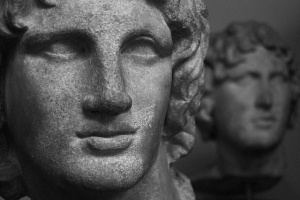Why You Should Compare Yourself to the Greatest Men in History
 Hey friend,
Hey friend,
Today you’re going to learn to do something that’s incredibly important in the long-term.
Topic of discussion: How to consciously compare yourself to great historical men.
There isn’t much to explain, but there’s much to do. This is yet another elite mental habit that you need to establish if you want to get really, really successful and keep hustling when other people get content and complacent. What I’m about to tell you is also a great mental trick to boost motivation.
Know Thy Brain
A fundamental fact about the human brain is that it automatically compares things. Nothing is seen without relation to another thing. The brain focuses on an object and uses it as a reference point for one or many other things. This is a very powerful heuristic — and you should consciously use it to your advantage.
This way that your brain compares one thing to another has many real life implications, and explains things like:
Why hot girls have ugly-ass friends. (It makes the hot girl look even hotter.)
Why we think a product is better/cheaper/cooler than it really is when it’s placed next to another product that emphasizes this aspect. This trick is frequently used in sales and retailing. It’s called anchoring.
Why we easily mistake the size and distance of objects.
Dunbar’s Number. We have a finite number of personalities that we consciously or unconsciously compare ourselves to in relation to different aspects of our life.
Consider this a follow-up to what I previously wrote about Dunbar’s Number, except with more practical use. This is especially important to young readers — because the earlier you start consciously comparing yourself to great people, the more it adds up cumulatively in the long-term. The earlier you start practicing this skill, the quicker you’ll become unreactive to stupid people.
Here’s what you’ll do:
You are going to purposefully place the role models that inspire you the most in your 150 mental “Dunbar’s-Number-slots”. And you are going to think of them daily, until they feel like real people.
This will help you greatly because it will raise your standards of conduct far above that of average people who compare themselves to their mediocre buddies.
Do this:
Find great historical men that you look up to. If it’s a living person that’s fine too, but there’s less biographical information about people currently living. And historical men are usually cooler.
Find as much, and as accurate, information as possible on these people. You want to reach the point where your brain starts thinking that they are “real” and “alive”. That’s when they’ve successfully become part of your “Dunbar’s-Number-slots”.
Keep this up for years. Keep doing the repetitions.
And how do you know that they are part of your Dunbar’s Number?
–Here’s a great indicator. When you are able to answer the question, “What would X do in this situation?”, then you’re well on your way.
How will this help you?
–You will improve the odds of your brain comparing itself with your closest peers or acquaintances. You will be prone to compare yourself more with the great historical men. And in doing so you will be motivated to do great things and put in more effort where others get lazy.
This is not an immediate process. It takes time and much mental effort. But it does produce results — and it is within your power to do. Therefore you should do this daily.
In a practical situation this means that you’re less likely to fall under the spell of bad judgment and waste time doing, thinking, or talking about petty things.
When you see your peers wasting time discussing the Olympics, messing up their sleep schedules by partying too hard, and losing discipline, you will stand there firm like a rock. For in your head echoes the question:
What would Caesar do here?
What would Hannibal do here?
What would Churchill do here?
The earlier in life you start doing this, and the more you practice it, the more you stand to gain. In my experience, very few people do this at all. I don’t think I know of more than a few people who do this, except myself. And none of them do it as much as I.
Resources:
You might enjoy reading this post I wrote for Addicted2Success: Why You Should Study Historical Men. It goes more in-depth on reasons for why you’d want to do this.
A Starting List of Great Historical Men for You to Study:
If you don’t already know who to study and learn more about, I have a few helpful examples to get you started:
Julius Caesar
Napoleon Bonaparte
Henry Ford
Winston Churchill
Nikola Tesla
Thomas Edison
Thomas Jefferson
Benjamin Franklin
Calvin Coolidge
John F Kennedy
Josef Stalin
Adolf Hitler
Hannibal Barca
Genghis Khan
Alexander the Great (he’s the guy in the featured image of both my last two posts)
John D Rockefeller
Ralph Waldo Emerson
Henry David Thoreau
Albert Einstein
Marcus Aurelius
Gnaeus Pompeius
Seneca the Younger
Cato the Younger
Marcus Cicero
Aristotle
Socrates
Plato
Leonardo Da Vinci
Francis Bacon
Johann Wolfgang von Goethe
Start by reading their Wikipedia and Wikiquotes pages. By doing that you’ll get a good overview and gain investment from your brain. This will make it more interesting and easy to continue studying these men. It will motivate you to read their biographies and historical books to learn more about the context in which they lived.
What to Do Next:
– Aid other readers — and me — by sharing your favorite great historical men to study. If you don’t know of any, just tell us about some successful person that we can learn more from by studying!
Photo credit: Evgeny Legedin
The post Why You Should Compare Yourself to the Greatest Men in History appeared first on Startgainingmomentum.



